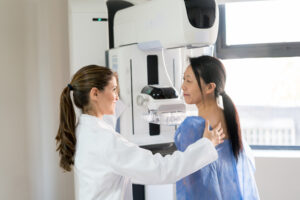After your latest mammogram, you received a letter from the imaging center noting that you have dense breasts. What does that mean, and how does it affect your health?
The first thing to know is that it’s a pretty common finding. According to the National Cancer Institute, around half of all women over age 40 who get mammograms are identified as having dense breast tissue.
Breast density has been in the spotlight recently because we now know that it can impact the risk of developing breast cancer. Keep reading to learn more about what that means and how you can protect your health.
Understanding Breast Density
There are three types of breast tissue—fibrous tissue, glandular tissue, and fatty tissue.
Fibrous tissue, which can be found throughout the body, holds the breasts in place. Glandular tissue is the part of the breast that makes milk, including the lobes and the ducts. Fatty tissue fills in the remaining space in the breast between the fibrous tissue, the lobes, and the ducts.
Most of us give little to no thought to the tissue in our breasts, beyond how it affects their shape and size. A mammogram, though, provides enhanced images of the breasts, magnifying and identifying the different types of tissue.
When a radiologist reviews the images gathered during a mammogram, the breast tissue is categorized in one of four ways:
- About 10 percent of women have breasts that are almost entirely fatty.
- About 40 percent of women have a few areas of dense tissue in the breasts.
- About 40 percent of women have breasts that are heterogeneously dense, meaning the tissue is evenly dense throughout the breasts.
- About 10 percent of women have breasts that are extremely dense.

Women whose breast tissue is in the first two categories are said to have non-dense breasts, while those in the second two categories have high-density (dense) breasts. Dense breasts contain little fatty tissue, while non-dense breasts contain less fibrous and glandular tissue.
Why Having Dense Breasts Matters
OK, now you know what it means to have dense breasts, but how does it impact your health? That’s a great question.
Breast density matters for two reasons.
1. Having dense breasts can make it more difficult to detect breast cancer. Breast tissue that’s dense, meaning it contains more fibrous and glandular tissue (sometimes called fibroglandular tissue), appears as white on a mammogram, similar to the appearance of abnormal breast changes like tumors.
This similarity can make it more challenging to detect cancerous tissue, often increasing the need for follow-up mammograms or other imaging scans.
2. Having dense breasts is also considered a risk factor for developing breast cancer. While research is needed to determine why that’s the case, it is now known that the more dense your breast tissue, the higher your risk of developing breast cancer.
These two facts about breast density are part of why state and federal health organizations now require that women be informed when they have dense breasts. Tennessee has required this notification for several years, and in March 2023, the Food and Drug Administration published a rule that mammogram reports sent to patients must include information about breast density.
How to Protect Your Health When You Have Dense Breasts
If you’ve been told your breast tissue is dense, you may wonder what that means for your health. One thing to note is that your breast density can change throughout your life.
Young women, those who are pregnant or breastfeeding, women who are taking hormone replacement medications, and those who have a lower body weight are more likely to have dense breast tissue.
Because you can’t tell how dense your breasts are by feeling them or looking at them, most women are unaware they have dense breasts until they undergo their first mammogram, usually around age 40. Once you receive the results of that mammogram, you’ll also know about how dense your breasts are.
If you have dense breasts, don’t panic. Simply consider the information a helpful addition to your medical records. At your next appointment with your OB/GYN or another women’s health provider, talk about your specific risk for breast cancer.
If you have other risk factors for breast cancer, such as a family history of the disease, your provider may recommend that you undergo more frequent mammograms or additional screenings to keep an eye on your breast health. Breast ultrasounds and breast MRIs are often recommended as supplementary screenings for women who have dense breasts.
Regardless of your breast density, it is important to continue having regular mammograms. Most breast cancers can still be diagnosed using mammograms, even in women who have dense breast tissue. It’s a good idea for women with dense breasts to opt for 3D mammograms, also known as digital breast tomosynthesis, since these images are enhanced for better visualization.
You can also talk with your provider about other steps you can take to lower your risk of developing breast cancer, like practicing a healthy lifestyle. Maintaining a healthy weight, being physically active, limiting alcohol consumption, and eating a balanced diet filled with fruits and vegetables can all help lower the risk of cancer, including breast cancer.
Have other questions related to your breast health or your risk for breast cancer? Schedule an appointment today with one of the providers at West Tennessee Medical Group Women’s Health.
